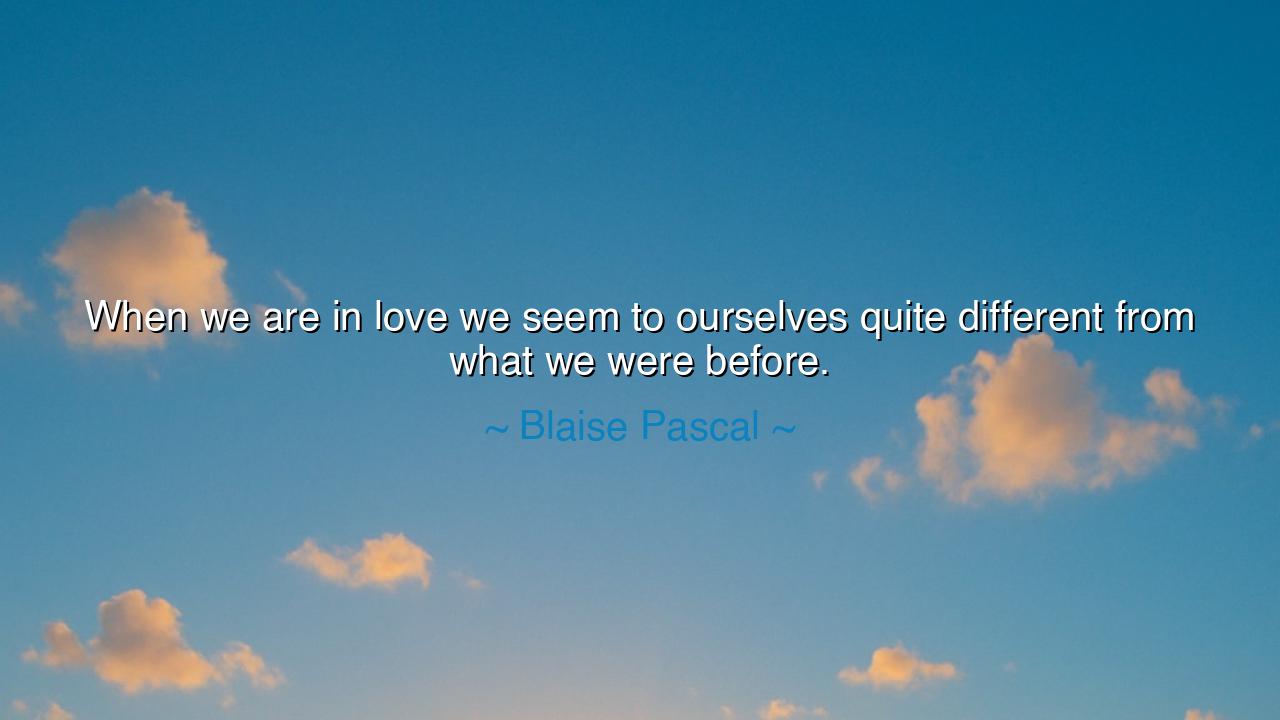
When we are in love we seem to ourselves quite different from






“When we are in love we seem to ourselves quite different from what we were before.” – Blaise Pascal
Thus speaks the philosopher who peered into both the depths of the mind and the mysteries of the heart. Blaise Pascal, that rare union of mathematician and mystic, understood that love is not merely a feeling that visits the heart, but a transformation of the very self. When he says that we “seem to ourselves quite different,” he is not describing illusion, but revelation — the unveiling of what lies hidden within us. For love, when true, does not simply add to who we are; it awakens who we were meant to be.
The ancient sages often taught that the soul contains within it both the divine and the dormant — that within every person sleeps a greater version of themselves, waiting to be stirred by wonder. Love is that stirring. It shifts the center of our being away from the cold gravity of self, drawing it instead toward another soul. Suddenly, life burns with color, time grows radiant, and even our own reflection feels unfamiliar. We speak more gently, dream more boldly, forgive more easily. We begin to see the sacred in the ordinary. This is why Pascal calls love transformative — it reorders not only the heart, but the whole universe of the self.
Yet this transformation is not born of fantasy. It is the consequence of devotion. For in loving another, we step outside the narrow confines of our ego and glimpse a higher form of existence — one governed not by self-interest, but by communion. Love, in this sense, is a mirror held to the soul. It shows us both our beauty and our imperfection; it humbles and exalts us at once. In the eyes of another, we discover both who we are and who we might become. This is the alchemy of love — that it changes not the world around us first, but the one within.
Consider the story of Antoine de Saint-Exupéry, the aviator and author of The Little Prince. He once wrote that “love does not consist in gazing at each other, but in looking outward together in the same direction.” When he fell in love, his writings shifted from technical observation to poetic wonder. Through love, the pilot became a philosopher, the wanderer became a teacher. His beloved inspired not possession, but creation — and in that creation, he found a new self. This is Pascal’s meaning made flesh: that love makes us “different from what we were before,” not by altering our essence, but by revealing its hidden depth.
In the age of the ancients, the poets of Greece and Rome sang of love as a divine madness — a fire that purifies as it consumes. Plato spoke of Eros as a ladder of ascent, through which the soul climbs from the love of one being to the love of all that is beautiful and good. So too did Pascal, centuries later, understand that to love deeply is to touch the divine — to feel, however briefly, what it means to exist for something greater than oneself. Love lifts the human spirit from the dust and reminds it of its immortality.
But this transformation is not without peril. For love magnifies everything it touches — joy and sorrow alike. The same heart that feels reborn may also feel shattered, for to give oneself fully is to risk loss. Yet Pascal, ever the man of faith, would remind us that even when love fades or wounds, its transformation remains. The self that has truly loved can never return to ignorance. It has glimpsed eternity through mortal eyes. And though that vision may hurt, it also heals.
So, dear listener, when love comes — whether for a person, a purpose, or life itself — do not resist its power to change you. Let it break open the shell of habit, let it strip away pride, let it teach you tenderness. For in becoming “different from what you were before,” you become more human, more alive, more luminous. Love is not a weakness, but a rebirth. It is the soul remembering that it was never meant to live only for itself, but to shine — brilliantly, vulnerably — in connection with another. And that, as Pascal knew, is the greatest transformation of all.






AAdministratorAdministrator
Welcome, honored guests. Please leave a comment, we will respond soon